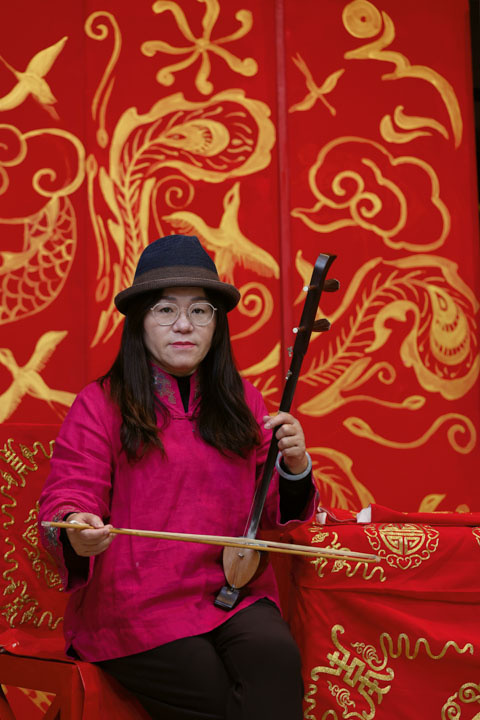
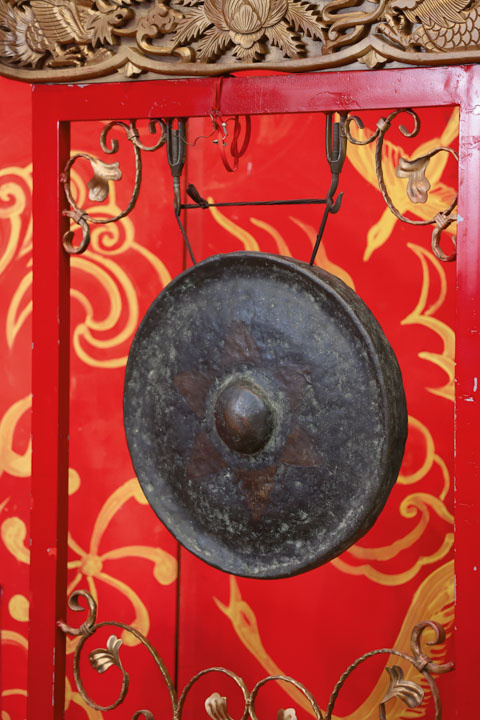
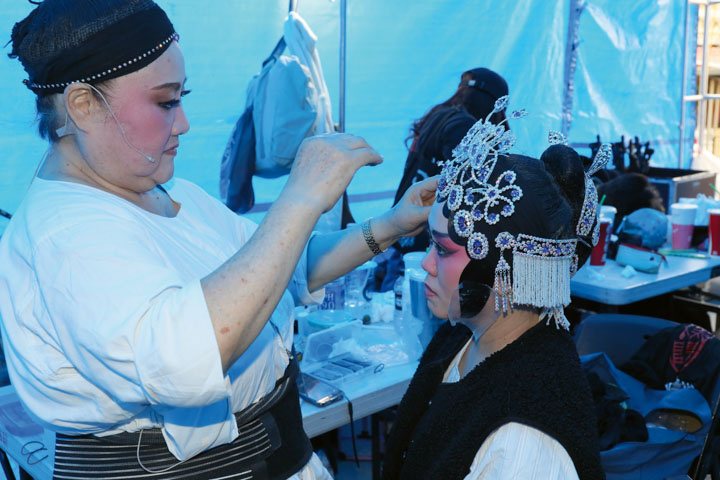
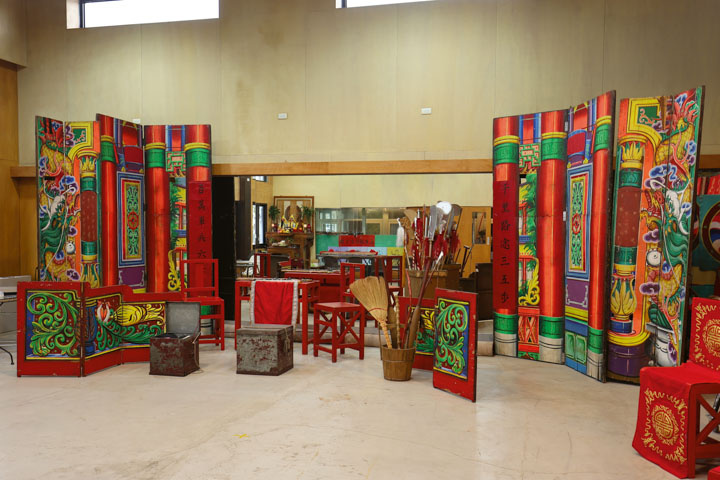
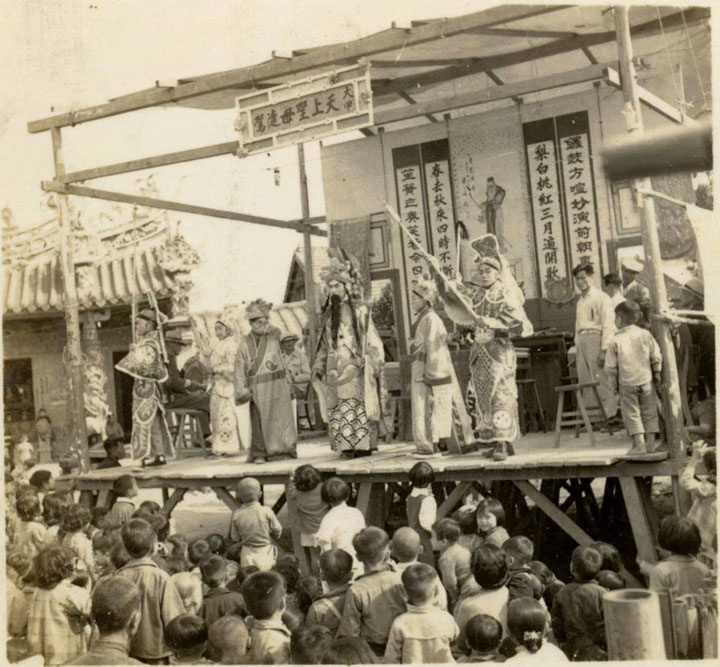
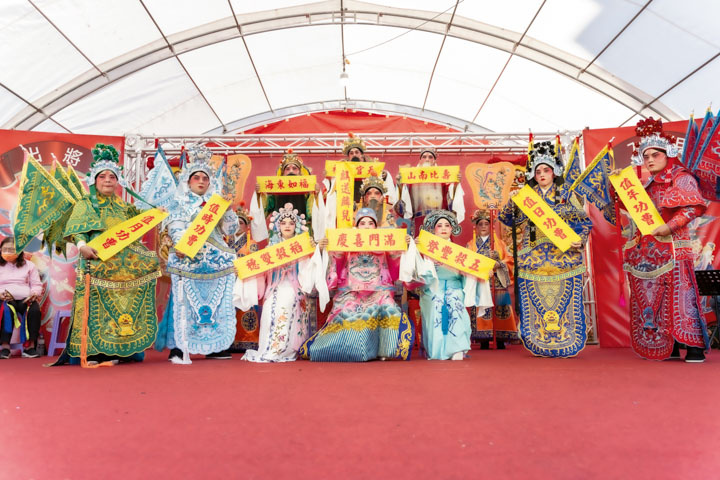
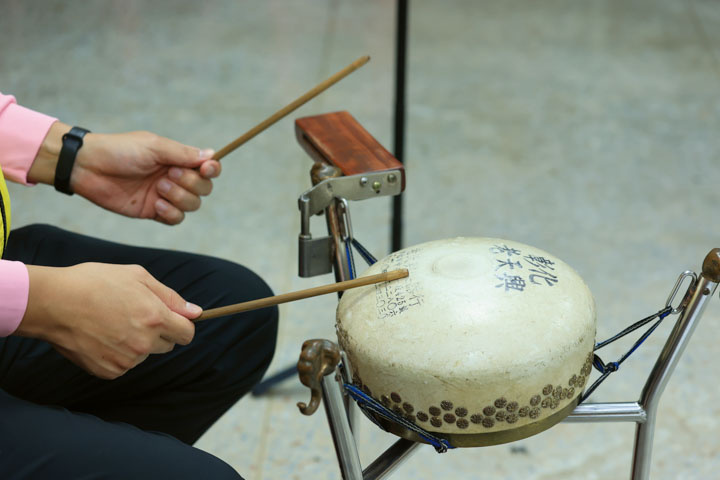
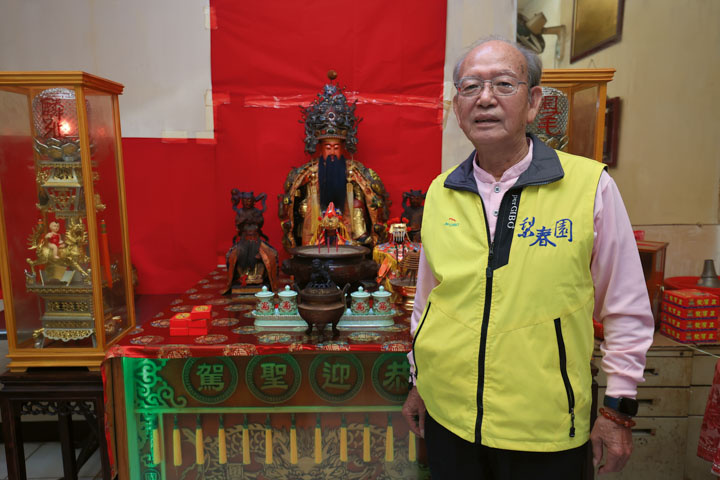
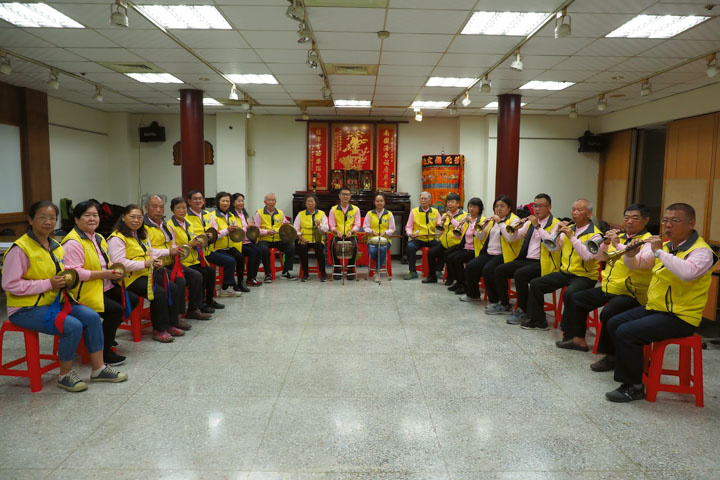
Every era has its music. Beiguan music was once Taiwan’s main popular music. Today, although Beiguan has fallen into decline, the Li Chuen Yuan Beiguan club of Changhua—the oldest amateur Beiguan organization in Taiwan—still rehearses almost every day. Meanwhile, the professional Hanyang Beiguan Troupe continues to perform year in and year out, acting out traditional dramas that are authentically Taiwanese.
Hanyang Beiguan Troupe
“Alas! Although my husband died in the war with the Western Liang, I am determined to remain chaste and true to his memory.” Wang Baochuan, holding fast in her broken-down home, sings in the Beiguan xipi yuanban style as she relates her desolation and sadness after her father tries to force her to remarry.
After 18 years of waiting, sacrificing her youth, finally her husband Xue Pinggui, whom she had believed to be dead, returns from captivity. In an aria performed in the up-tempo jinban style, she sings a story of treacherous ministers, mutiny, and rebellion, but one which ends with the happy reunion of husband and wife. This is the Beiguan drama Dadengdian, which is performed at the annual firewalking ritual held at Erjie Wanggong Temple in Yilan County, in which barefoot believers carry statues of deities over hot coals.
The Hanyang Beiguan Troupe (then called the Hanyang Opera Troupe), which is currently the only professional Beiguan drama company in Taiwan, was founded by Chuang Jin-tsai back in 1988 in accordance with the policy of then Yilan County magistrate You Si-kun to “use culture to develop the county.” Current troupe director Chen Yu-hwan recounts the company’s history from the beginning.
Traditional folk music
Founder Chuang Jin-tsai, who passed away in 2021, was a key figure in Beiguan circles in Yilan County. He trained in the Luodong Fulan Club, which is over 100 years old, and was involved in the operation of other troupes, including the Donglong and Jianlong companies. He could play any kind of Beiguan instrument well, but was especially good at the suona (a horn-shaped double-reed woodwind instrument), on which he attained a full and rich tone. He was respectfully nicknamed “the suona tiger.”
Beiguan music arrived in Taiwan during the Qing Dynasty in the wake of settlers from the southern part of China’s Fujian Province. Professor Lin Mao-hsien, chairman of the Department of Taiwanese Languages and Literature at National Taichung University of Education, notes that after the separate art forms of Peking Opera, Kunqu Opera, and Xiqin Opera came to Taiwan, they were amalgamated by local society into a performance art encompassing both music and theater which was called “Beiguan” (literally “northern pipes”). Beiguan is thus a uniquely Taiwanese phenomenon in traditional music.
In comparison to the more elegant Nanguan music (“southern pipes”), which was preferred by people of refined tastes, the boisterous, clamorous Beiguan became embedded in the daily life of ordinary people, and flourished in Taiwan’s environment. Lin Mao-hsien calls Beiguan “Taiwan’s heavy metal music,” and it is the variety of traditional music with which ordinary people are most familiar and comfortable.
The golden age of Beiguan
Chuang Jin-tsai formed the Hanyang Beiguan Troupe at the peak of popularity of Beiguan, which is also called Luantan Opera when performed onstage by professionals. Following Taiwan’s economic take-off in the 1970s, citizens invited opera companies to perform when offering thanks to deities, when redeeming vows made to gods, and even when offering each other apologies and marking gambling wins or losses. Opera companies were booked up solid, and at their busiest could put on more than 200 shows a year.
Hanyang boasts three masters of female roles—Lee A-ji, Lee Mei-nyan, and Wong Cheng-mei—who have won admiration for the company. Lee Mei-nyan was designated a “preservation artist” for Beiguan Opera by the Yilan County Government in 2022. While applying her makeup backstage, she relates: “I joined my first opera company when I was 28, and I’ve been at it for 40 years now. For dramatic effect onstage, I’ve even hung by wires. When we did a good performance, opera fans would give money as a reward.”
Besides the rising and falling melodic singing patterns required of Beiguan artists, there are also distinctive stage movements and postures, and they must memorize the guanhua (“official language”) of Beiguan, an old-fashioned form of Mandarin that is used for spoken parts rather than modern Mandarin or Taiwanese Hokkien.
As a growing number of leisure and entertainment options became available in society and Beiguan artists aged and passed away, a serious generation gap appeared in terms of performers willing to take on the art form, while audiences also declined. Both professional troupes and amateur Beiguan clubs faced extinction, and it grew ever harder for troupe members to make a living.
Chen Yu-hwan took over the reins of the Hanyang Beiguan Troupe from Chuang Jin-tsai eight years ago in a ceremony at a shrine to Xiqin Wangye, the deity of theater. Chen has continually sought out opportunities to perform, applying the formula “Beiguan Opera by day, Taiwanese Opera by night.” She explains that Beiguan Opera is performed for the deities, while in the evenings Taiwanese Opera is staged for people. But by watching Beiguan Opera, not only can people get a chance to listen to tumultuous Beiguan music, they can also appreciate the performers’ cadences, melodies, and verve. The touching stories in these dramas, in which the characters have lofty ideals, can inculcate timeless values such as loyalty, filial piety, chastity, and righteousness in the audience, and can be a valuable asset in contemporary society.
The Li Chuen Yuan club of Changhua
At the Changhua County Museum of Traditional Nan Bei Music and Theatre, the only institution of its kind in Taiwan, members of Taiwan’s oldest Beiguan club, Li Chuen Yuan, rehearse five days a week.
As soon as you set foot in the rehearsal room in the basement, you hear resounding music that blots out everything else. With serious and attentive expressions on their faces, the club members produce a thunderous clamor with their instruments. The history of people “playing in a band” at Li Chuen Yuan goes back over 200 years.
Staying in the forefront
Ye Jin-cyuan, director of this talented musical group which has put out over 36 vinyl albums, says that according to research by Professor Hsu Tsang-houei, himself a musician and composer, the only evidence now available of the club’s age is a plaque presented to it in 1930 by Nanyao Temple to mark the 120th anniversary of its founding in 1811. On this basis, the history of Li Chuen Yuan goes back at least 212 years.
The 1970s were a golden age of Beiguan in Taiwan. Performers of this music have always been divided into “professional” and “amateur” categories, with amateurs being known as “younger brothers,” and back then almost every township in Changhua had its own Beiguan club, and the county had the highest concentration of Beiguan clubs in all Taiwan.
Ye Jin-cyuan says that his father, Ye A-mu, not only put up money and invested a lot of effort into the club by heading it and managing its affairs, but was also an accomplished artist who was skilled at “refined songs.” During the golden age under his leadership, when they recorded so many disks, Ye Jin-cyuan remembers that his father wrote out the music in songbooks, of which there were more than 200. The notebooks had colored pages, and every time the pages were turned during club rehearsals, it was like flipping through a colorful calendar.
Clamor and cultural identity
In 2009 Li Chuen Yuan was recognized as an important group preserving the intangible cultural heritage of Beiguan music. However, only two years later Chen Zhulin, who taught newcomers and was himself a performer, passed away. The group faced a crisis: There was no one to pass along the traditions, and the club nearly broke up. But then Ye Jin-cyuan, who had never studied Beiguan music at all and was busy running his auto repair shop, decided to take on the task of managing the club’s affairs.
Yang Yahui and Bobo Chen, students in the Graduate Institute of Ethnomusicology at Tainan National University of the Arts, came to the group in a different way. They joined Li Chuen Yuan in order to research their university theses, but by practicing with the group five days a week they gained a sense of attachment and belonging, and “playing in the Beiguan band” has become part of their lives.
Chen, who majored in the dizi (bamboo flute), says: “Beiguan music may not be an integral part of young people’s lives today, but after I came in contact with it I discovered that it offers endless possibilities. Its richness lies in its versatility: It can be played in a purely musical performance or by a band leading the procession of a deity, while its ‘silk and bamboo’ instruments [i.e., strings and woodwind] can accompany rituals at Confucian temples, and it can also be part of opera performances.”
Li Chuen Yuan’s administrative assistant, Chen Chin-yu, who works at National Changhua University of Education, had a liking for the suona and joined the club after attending its training classes. He feels that the social cohesion achieved through religious faith is also a force that draws the club members together: Li Chuen Yuan leads the annual Mazu procession from Changhua City’s Nanyao Temple that visits the former “South Street” (part of today’s Minzu Road), and the club also performs at Nanyao Temple on the 23rd day of the third lunar month, and for the birthday of the deity Wangye on the 24th day of the sixth lunar month.
It is this cohesion among club members, says director Ye Jin-cyuan, that has enabled Li Chuen Yuan to exist for such a long time.
The fact is that for amateur performers, Beiguan is both a form of entertainment and a medium for social interaction and friendship. It offers a feeling of accomplishment throught learning an art form, and is a way of upholding the honor of the locality. Even more importantly, the commitment and dedication of amateur Beiguan performers has never diminished over time.